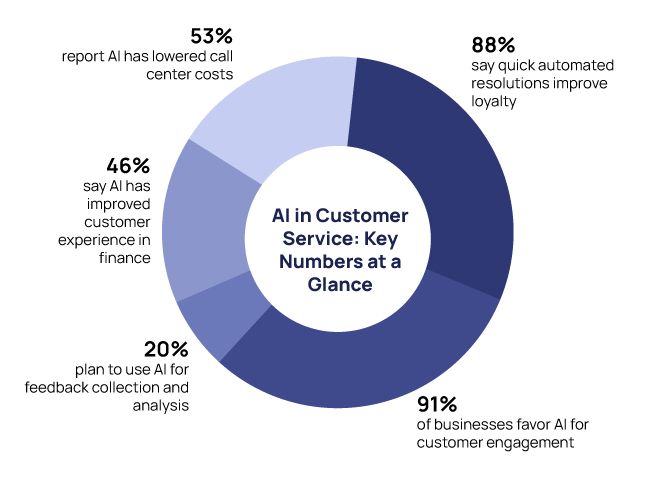AI in Customer Experience: Tips and Tricks That Work

Ready to turn every customer chat into a personalized experience? AI in customer experience adapts to each person’s needs in real time. Explore the blog for practical ways to implement AI in customer service that make support feel truly human.
The Role of AI in Modern Customer Support
Imagine a customer clicking on your site, frustrated and in a hurry. In the old days, they might have sat in a queue, listened to hold music, and repeated their issue to multiple agents. Today, they’re greeted instantly by an AI-powered assistant that already knows their purchase history, understands their tone, and can offer solutions before they’ve even finished typing. That’s the shift AI has brought to customer service with speed, personalization, and insight at scale that humans alone can’t match.
Behind the scenes, machine learning for personalization analyzes past interactions to predict what that customer might need next. NLP in customer service decodes intent from a short message or voice call. CX automation takes care of the repetitive legwork, so human agents can focus on moments that require empathy, persuasion, or problem-solving finesse. The result isn’t cold or robotic, it’s service that feels smarter, more relevant, and surprisingly human. For marketers, this isn’t just operational efficiency; it’s a powerful tool for building loyalty and shaping brand perception. Every smooth, tailored interaction strengthens customer satisfaction and the emotional connection between customer and brand.
Examples of AI in Customer Service and How They Transform Support
AI tools for customer service improve speed, accuracy, and personalization across both human-assisted and self-service channels. They automate routine tasks, support agents in complex interactions, and anticipate customer needs before they arise.
Here are practical ways to implement AI in customer service and the technology behind each one:
Instant Assistance with Chatbots and Virtual Assistants
AI chatbot tools and advanced virtual assistants provide round-the-clock help for common queries, order tracking, troubleshooting, and AI product recommendations. They use natural language processing and machine learning to understand context, improve over time, and maintain conversations across channels like chat, voice, social media, and email.
Conversational AI and Generative Responses
Conversational AI enables more human-like, context-aware interactions through voice or text. Generative AI can draft replies, summarize case histories, and tailor messages using data from CRM systems and knowledge bases. This reduces response times and supports real-time response optimization, allowing agents to focus on complex tasks.
Smarter Routing and Task Automation
AI analyzes intent, sentiment, and language in incoming queries, then routes them to the right agent or department. Automated support systems can tag tickets, suggest responses, initiate returns, and synchronize customer data, freeing agents from repetitive administrative work.
Proactive Predictive Support
Predictive analytics identifies potential problems, such as service disruptions, expiring subscriptions, or unusual account activity, and triggers help before customers ask. This also supports resource planning by forecasting demand, ticket surges, and staffing needs.
Understanding Customer Emotions and Sentiment
Sentiment analysis evaluates the tone and intent of customer messages in real time. It helps prioritize urgent cases, adapt responses to emotional cues, and spot patterns in feedback, reviews, or social media activity. User behavior analysis further refines these insights for targeted actions.
Personalized Recommendations and Targeted Offers
Recommendation systems and behavioral analytics tailor product suggestions, self-service resources, and follow-up messages to each customer’s preferences and history. This enables AI-powered strategies for better product recommendations and supports upselling and cross-selling opportunities.
Enhanced Self-service and Knowledge Management
AI-driven self-service tools present customers with the most relevant articles, videos, or troubleshooting guides. Intelligent search understands conversational queries, while knowledge bases are automatically organized, updated, and optimized based on usage patterns.
Real-time Agent Support and Quality Assurance
Agent assist tools provide on-screen guidance, suggested next steps, and quick access to relevant knowledge articles during live interactions. Best AI tools for enhancing CX also monitor conversations across channels, flag compliance risks, and identify coaching opportunities.
Voice Recognition, IVR, and Call Optimization
Voice AI enables natural language interactions in phone systems, eliminating rigid menu navigation. Real-time transcription, translation, and sentiment analysis support multilingual service and how AI chatbots improve response time by reducing call handling delays.
Operational Insights and Continuous Improvement
AI examines support data to detect trends, recurring issues, and service gaps. These insights guide process improvements, content updates, and automation opportunities, helping teams understand how to use AI to improve customer experience.

AI-powered Advantages for Modern Customer Service
Implementing AI in business streamlines operations, supports agents, and creates better customer experiences. It handles routine work, provides data-driven insights, and enables teams to deliver faster, more consistent, and more personalized support.
Let’s explore the key advantages:
- Higher Productivity and Efficiency: AI handles repetitive and routine tasks, allowing agents to focus on complex or sensitive issues. It also provides real-time guidance, insights, and suggested next steps, helping agents work faster and with more accuracy.
- Faster and Always-on Support: Virtual assistants in customer support deliver instant answers and run 24/7, reducing delays and making help accessible anytime across different channels.
- Personalized Customer Interactions: AI uses customer data for personalizing customer experience with AI analytics.
- Consistent and Scalable Service: AI ensures customers receive consistent information across chat, email, phone, and social channels. It also manages high volumes of requests without overloading teams.
- Proactive Problem-solving: AI can anticipate customer needs by analyzing history, behavior, and context, offering solutions before issues escalate.
- Cost and Resource Optimization: Automating routine inquiries lowers operational costs and allows better use of staffing resources without sacrificing service quality.
- Better Quality Control and Insights: AI monitors interactions in real time, flags issues, and identifies opportunities for training. It also analyzes customer data to uncover trends and inform service improvements.
- Greater Accessibility: Voice assistants, multilingual support, and other AI features make it easier for customers with disabilities or language barriers to get help.
Best Practices for Integrating AI into Customer Support
AI in customer experience can improve service efficiency, accuracy, and personalization, but its success relies on thoughtful implementation, ethical practices, and ongoing refinement.
Here are the main areas to focus on:
Define Clear Objectives
Decide what you want AI to achieve before deployment. Goals include faster response times, reducing repetitive tasks, and improving AI-powered personalization. Clear objectives help measure success and prevent wasted investment.
Keep the Human Element
Use AI for high-volume, routine requests, but route sensitive, complex, or emotional cases to human agents. This keeps interactions empathetic and builds trust.
Communicate AI Use Openly
Tell customers when they are speaking to AI and when a human is available. Transparency sets expectations and builds credibility.
Train with High-quality Data
Feed AI clean, representative, and relevant customer data. Review data regularly to avoid outdated, biased, or inaccurate responses.
Use Feedback for Improvement
Collect customer and agent feedback to refine AI over time. Real-time input helps models adapt and stay relevant.
Integrate with Existing Systems
Use AI in customer experience by linking it with your CRM, ticketing, and service systems to keep context and continuity. Skip isolated tools that break workflows.
Personalize Interactions
Personalize interactions using AI-powered strategies for better product recommendations and sentiment analysis. Avoid generic, ‘one-size-fits-all’ replies.
Address Ethical and Privacy Concerns
Follow data privacy laws (like GDPR) and design AI to avoid bias. Implement audit trails, access controls, and transparency in decision-making.
Monitor for Errors and Bias
Use human oversight to review AI outputs, especially in sensitive contexts. Test regularly to catch mistakes early.
Prepare and Train Your Team
Educate agents on how AI works, when to rely on it, and when to step in. Involve teams early to reduce resistance.
Plan for Scalability
Choose AI tools that can adapt to higher volumes, new channels, and evolving business needs without heavy reengineering.
Measure and Refine
Track KPIs such as resolution rate, CSAT, and escalation frequency. Adjust AI strategies based on these results for better ROI.
Transform Customer Service Delivery with JynAI Essentials
JynAI Essentials gives customer support teams AI tools tailored to their industry, whether they work in property management, law, retail, or hospitality. It connects directly to your existing systems, adding AI capabilities where they’re most useful, automating repetitive tasks, improving accuracy, and delivering real-time insights. This reduces administrative work so that agents can focus on resolving customer issues quickly and effectively. Instead of managing multiple disconnected apps or generic AI platforms, you have a single solution that integrates with your workflows, adapts to your workflow, and supports faster decision-making.
In customer service, JynAI Essentials can automate work summaries, create knowledge articles, and provide agents with instant access to customer, asset, and service history data. It also enables personalized responses and helps field service teams prepare for jobs with accurate information. By starting small and expanding over time, you can improve both customer experiences and agent efficiency without overhauling your existing systems.
Sign up for JynAI Essentials today to streamline your customer support and give your team the AI advantage.
FAQs
What is AI in customer support?
Artificial intelligence in customer support uses technologies like chatbots, natural language processing, and automation to handle customer inquiries, provide answers, and assist human agents in resolving issues faster.
How does AI improve response times?
AI can instantly recognize queries, retrieve information, and respond in seconds. This reduces waiting times and helps customers get solutions faster.
Is AI customer service available 24/7?
Yes. AI-powered systems can work continuously without downtime, providing consistent support outside of regular business hours.
How accurate is AI in understanding customer queries?
Accuracy depends on the AI’s training data and language capabilities. Well-trained AI can correctly interpret most queries, but it may still misinterpret slang, sarcasm, or ambiguous language.
Can AI handle multiple languages?
Many AI support tools offer multilingual capabilities, allowing companies to serve customers across different regions without separate teams for each language.
Does AI customer support require a lot of setup?
Initial setup can take time for training, integration, and customization. Once deployed, updates and improvements are ongoing but require less effort.
How does AI help human agents?
AI can suggest answers, summarize customer history, and handle routine questions, freeing human agents to focus on complex cases.
Are You Ready to Make AI Work for You?
Simplify your AI journey with solutions that integrate seamlessly, empower your teams, and deliver real results. Jyn turns complexity into a clear path to success.



